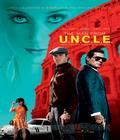If you grew up in the '80s or '90s, you probably missed out on "The Man From U.N.C.L.E." TV show. It ran from 1964-1968, during the height of the Cold War, when stories about international spies were all the rage. For reference, the first James Bond film, "Dr. No," hit theaters in 1962. For the new film, director Guy Ritchie could have updated the setting and rebooted it as a modern thriller. Instead, he wisely kept the '60s setting and visual aesthetic, resulting in a film that works far better than any "reboot" set in today's world could've ever hoped to fare.
Ritchie's "The Man From U.N.C.L.E." is set in 1963 and tells the origin story of the organization and its two main players, Napoleon Solo (Henry Cavill) and Illya Kuryakin (Armie Hammer). Whether you're new to the franchise or have seen every last episode, it doesn't really matter because Ritchie makes sure to start at the very beginning. All of the good stuff is shown directly on-screen, though much of the backstory is related in Ritchie's trademark style, with fast cuts and vocal explanation.
What makes "The Man From U.N.C.L.E." work is the combination of a smart script and stellar chemistry between all three of its leads. That includes Cavill and Hammer as well as Swedish actress Alicia Vikander, who plays Gaby Teller, a woman who both Solo and Kuryakin want to protect, even though she has her own secrets (and agenda) to pursue.
From the first moment you see Cavill on-screen as Solo, he simply oozes swagger and never lets up. Solo is cocky, but it's evident the self-confidence is well earned, as his abilities are put front and center in an impressive opening sequence. Kuryakin is Solo's opposite but his equal in every regard. Whereas Solo is suave and tends to favor the subtle approach (if possible), Kuryakin is more like a bull. He goes in strong and doesn't see the point in restraint.
Watching these two go at it with each other a highlight of the film. Every time Solo or Kuryakin thinks they have one-up'ed the other, something happens, and a witty insult is at the ready. For all their competition, it is clear that these two macho men quickly developed a respect for each other and their methods. They may be two sides of the same coin, but they are more complementary than they are contradictory.
Even though the story focus may be on Solo and Kuryakin, Vikander is no shrinking violet. She commands the screen as Teller whenever she makes an appearance. Teller is presented as a perfectly capable woman who tolerates Solo and Kuryakin — only because she thinks they can benefit her. Vikander brings an impressive level of depth to a character that could have easily been relegated to the trope of a damsel in distress; instead she turns that trope to her advantage.
Also deserving of a mention is Elizabeth Debicki as Victoria Vinciguerra, the primary antagonist of the film. Vinciguerra is ruthless when it comes to money and power, though she prefers to attack with the touch of a scalpel rather than the bluntness of a hammer. Debicki brings Vinciguerra to life with a level of diabolical charm that is worthy of a classic Bond villain. Throughout the film, Vinciguerra always seems like someone who is a real threat and not just a generic baddie.
Keeping "The Man From U.N.C.L.E." set in the '60s allows for visual splendor, but it also has the advantage of keeping technology limited to a simpler time. That isn't to say that our three leads don't have access to shiny gadgets. It's just that they have to use their heads in order to survive. Unlike the latest "Mission Impossible" film, where the gadgets are almost magical, here, the tech is purely in a support role. As a result, the characters are always front and center.
Ritchie's direction both complements the look of the film and helps move the story forward. The action scenes are a step up from what we saw in the two "Sherlock Holmes" films. It's a style that he's been constantly evolving since "Lock, Stock and Two Smoking Barrels," making liberal use of split-screens and fake digital zooms to show multiple points of view at the same time. The climatic sequence benefits greatly from Ritchie's signature style.
Comedic bits are carefully sprinkled throughout, with an impeccable sense of timing. The jokes rarely missed their mark, no matter if the humor was primarily visual or based on a double entendre.
If anything, "The Man From U.N.C.L.E." feels most like an old-school James Bond film crossed with the original "Mission Impossible," and that's a very good thing. The focus is always on the characters, the likeable rogues, who are figuring out how to get it all done, even if the means are unconventional. With a solid cast, a sharp script and solid direction, "The Man From U.N.C.L.E." is easily one of the best action films this year.
Score: 8.5/10
"The Man From U.N.C.L.E." is rated PG-13 and has a running time of 1 hour and 56 minutes. It is showing in 2-D and IMAX.
More articles about The Man From U.N.C.L.E.













 Forced to put aside longstanding hostilities, a CIA agent and KGB agent team up to stop an international criminal organization that is trying to destabilize the world with nuclear weapons and technology.
Forced to put aside longstanding hostilities, a CIA agent and KGB agent team up to stop an international criminal organization that is trying to destabilize the world with nuclear weapons and technology.
































